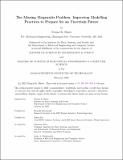| dc.contributor.advisor | Macdonald, Ruaridh | |
| dc.contributor.advisor | Ilić, Marija | |
| dc.contributor.author | Bhatt, Nirmal K. | |
| dc.date.accessioned | 2025-03-24T18:47:15Z | |
| dc.date.available | 2025-03-24T18:47:15Z | |
| dc.date.issued | 2025-02 | |
| dc.date.submitted | 2025-02-20T14:30:33.149Z | |
| dc.identifier.uri | https://hdl.handle.net/1721.1/158844 | |
| dc.description.abstract | Long-term energy system planning is one of the most pressing challenges for the power sector, which must maintain reliability while decarbonizing. Currently, no unified regulatory, modelling, or market framework exists in the United States to facilitate planning in pursuit of a clean and reliable grid. Variable renewable energy (VRE) generation can produce cheap power but they increase the grids exposure to interannual variability in demand and VRE generation. This raises questions about how grid planners will value VRE and clean firm power (such as nuclear power). This thesis evaluates the importance of considering interannual variability and clean firm power in long-term energy system planning. I use GenX, an open-source capacity expansion model, to model the U.S. New England region in 2050 assuming a high degree of electrification and various technology availability and emissions reduction pathways. I find that clean firm power will reduce the cost of decarbonizing the New England grid but that grid planners must consider decades of weather and demand data if they are to make appropriate investments. I also present a novel outputs-based timeseries clustering method which allows models like GenX to optimize grids using longer timeseries of weather and demand data. Based on my work, I recommend that policymakers, grid operators, and market designers establish rigorous standards around energy modelling for long-term planning that includes multiple scenarios and appropriately values technologies such as firm power. | |
| dc.publisher | Massachusetts Institute of Technology | |
| dc.rights | Attribution-NonCommercial-NoDerivatives 4.0 International (CC BY-NC-ND 4.0) | |
| dc.rights | Copyright retained by author(s) | |
| dc.rights.uri | https://creativecommons.org/licenses/by-nc-nd/4.0/ | |
| dc.title | The Missing Megawatts Problem: Improving Modelling Practices to Prepare for an Uncertain Future | |
| dc.type | Thesis | |
| dc.description.degree | S.M. | |
| dc.description.degree | S.M. | |
| dc.contributor.department | Massachusetts Institute of Technology. Department of Electrical Engineering and Computer Science | |
| dc.contributor.department | Massachusetts Institute of Technology. Institute for Data, Systems, and Society | |
| dc.identifier.orcid | https://orcid.org/0009-0008-9995-6702 | |
| mit.thesis.degree | Master | |
| thesis.degree.name | Master of Science in Electrical Engineering and Computer Science | |
| thesis.degree.name | Master of Science in Technology and Policy | |
